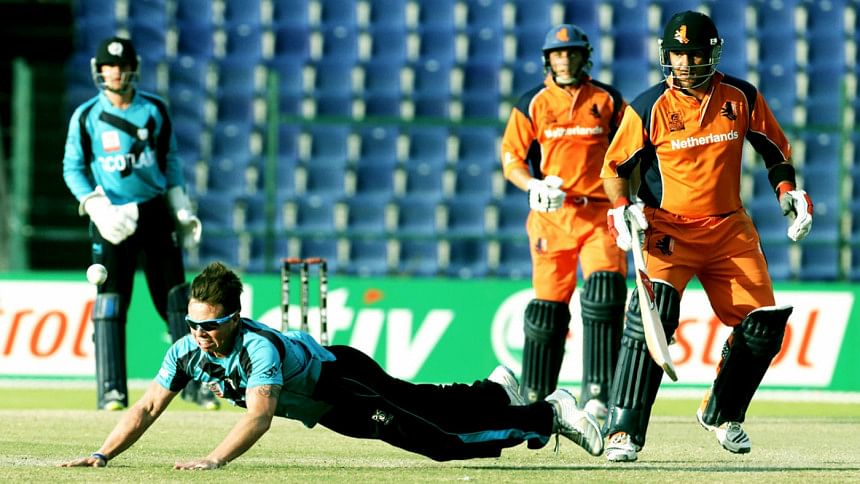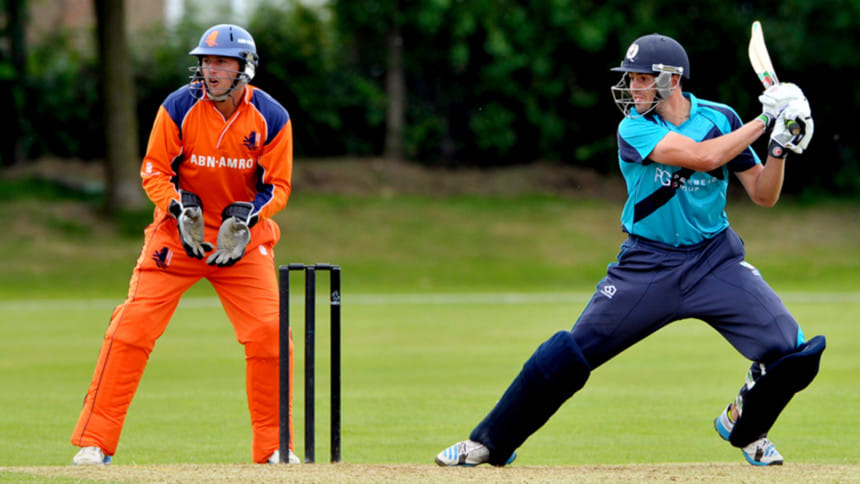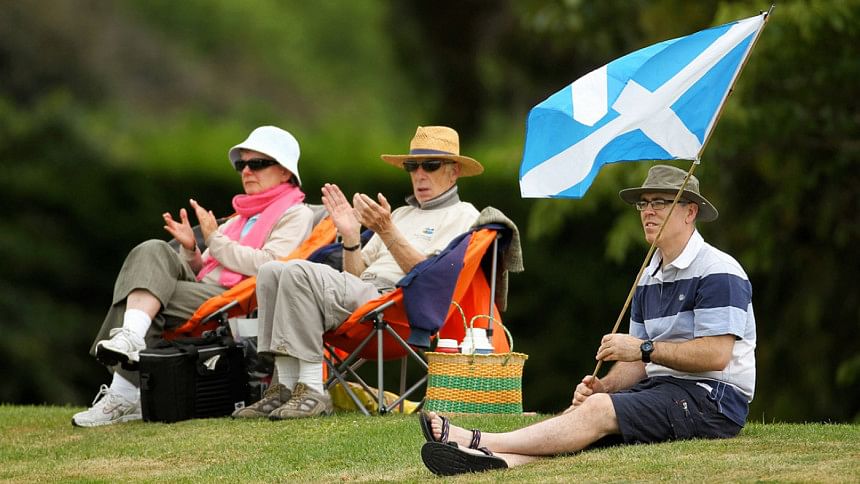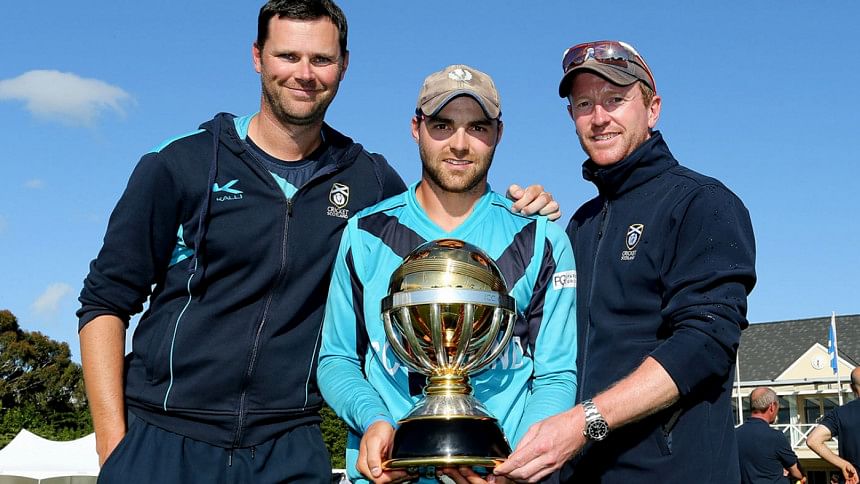Scotland's bumpy road to the World Cup

It is late afternoon at the Hagley Oval in Christchurch, New Zealand. It's overcast and too cold for January. Scotland are playing Kenya in the Super Sixes of the World Cup Qualifiers in front of a sparse crowd. Yet the number of spectators betrays the significance of the encounter. If the Scots win this game they qualify for the 2015 World Cup; if they lose, not only will they fail to qualify, the resulting, and substantial, cut in funding from the ICC may see Scottish cricket disappear into insignificance.
The score is 243 for 7 and Scotland require 18 runs from 12 balls. Rob Taylor and Safyaan Sharif are at the crease. Taylor, the senior of the pair, and the team's last recognised batsman, has scored 45 runs from his last six innings, and while Sharif can bat, he is primarily a bowler. They have played less than 20 ODIs between them.
The first ball of the 48th over is called wide. The spectating Scots muffle their merriment, while the Kenyans amplify their groans. Nehemiah Odhiambo gathers himself nervously at his mark and sets off towards the crease. His next ball is straighter, but it's in the slot. Taylor rocks back and heaves through the line. The connection is good and the ball is dispatched over long-on. The trajectory provokes overwrought yelps and nervous cheers. Six runs.
The rest of the over goes by in a flurry of spurious swipes, scrambles and stumbles. Panting and puffing, Taylor and Sharif deliver a lung-busting 13 runs to the total.
On comes Thomas Odoyo, a veteran, and the first man from outside a Test-playing nation to score over 1500 runs and take 100 wickets in ODIs. His first ball is a good one, cramping Sharif for room and provoking a false shot. The Kenyan fielders screech and cry in hope; the ball trickles to short fine leg for one run. The next ball is a good one too, but Taylor takes it from outside off stump and whips it through midwicket, and the pair scamper a frantic two runs. Odoyo lollops to the wicket again and muscles the ball into the pitch. It's too short and Taylor eases on to the back foot and cuts it powerfully through cover.
The scattered Kenyan fielders stand in disbelief while a pile-up of hugs and hard, congratulatory Scottish slaps spills on to the outfield. In the changing room after the match, "Oh Flower of Scotland", the team's victory song, is sung louder than it has been in years.
****
"In that tournament we were playing for our livelihoods," Preston Mommsen, the Scotland captain, recalls. "Our contracts really were on the line."
They went on to win the tournament, beating UAE in the final by 41 runs.
Yet behind this happy ending, the coruscating new contracts and the glitz and the glamour of World Cup qualification, there is an important back story.

Scotland's journey began in 2011 at the World Cricket League, a tournament for countries without Test status and one of the pathways by which Associate nations can qualify for the World Cup. In this particular version of the competition, the top two teams from its highest division, the WCL Championship, would win the chance to go to Australia and New Zealand.
Scotland started their campaign strongly, winning their first four games - two each against the Netherlands and Namibia. Commanding performances from batsman Kyle Coetzer, who scored three fifties in four games, and veteran spinner Majid Haq thrust the side into immediate contention.
Confident and in form, the Scots then travelled to Sharjah at the beginning of 2012 to play UAE - a team they were expected to beat. Yet they struggled. Fifteen of the 20 Scottish wickets to fall that series were taken by spinners, and Scotland mustered a miserly 372 cumulative runs. They lost both matches. "Travelling to Sharjah and playing in such alien conditions was difficult but overall we were disappointing," says Mommsen.
Back in Scotland for the summer of 2012, where spin is somewhat nullified by ubiquitous damp and slippery green pitches, the team lined up against Canada. The first game was abandoned due to bad weather. In the second, Calum MacLeod scored a composed 99 not out to guide the team to victory. It put Scotland back on track after their losses to UAE, and for MacLeod it was a knock that demonstrated his talent as a batsman - a role he had never intended play.
****
In 2008, MacLeod, a Glaswegian, was a pace bowler signed with Warwickshire. Tearing in at Edgbaston, or his local cricket club at Drumpellier, the then 19-year-old was one of Scotland's quickest bowlers and one of their most exciting prospects. But cricket can be an insidious game, full of shadowy by-laws and fine margins. In 2009, after an Intercontinental Cup game versus Canada, MacLeod's action was reported as illegal.
"It was pretty horrible time, I didn't really know what was going to happen to me," he said in an interview with Cricket Scotland TV.
At Warwickshire, MacLeod worked with Allan Donald for four months to reconstruct his action. Although there was some progress, it was not sufficient for the county to consider extending his contract and he was released at the end of 2010.
"At that time I probably wasn't good enough for first-class cricket as a bowler or as a batter, so they decided let me go," he said, "I understood their decision."
Back in Scotland, MacLeod didn't know whether to give up or continuing searching for more opportunities south of the border. Enter Cricket Scotland, which, in contrast to the cautious counties, saw a talent worth saving. MacLeod was awarded a summer contract in 2011 and from there worked his way into the senior side as a batsman.
Through a combination of his elastic wrists and a wholesome whack from his hockey days, and the ruthless resolve he learnt during his long remedial process, MacLeod became indispensable to the team. In New Zealand, he scored 401 runs in eight innings at an average of 50 -two centuries to his name. His performances were so impressive that, seven years after his first adventure down south, he was awarded yet another county contract, this time with Durham as a batsman.
****
Back on tour again, the players' away form continued to blight them. On a return trip to Sharjah, this time against a strong Afghanistan team, the side suffered two more defeats. This meant that success in their next two games against Kenya in June and July of 2013 was vital.

Back on Scottish soil the team was once again more convincing - winning both their games against the African side. Matthew Machan, a burly left-hander who also plays for Sussex, struck his first ODI hundred in the first of the two encounters; and Coetzer scored a crucial fifty in the second.
On the gurgle and slurp of Scottish outfields at least, Scotland's performances were unimpeachable.
So, travelling to Belfast at the back end of 2013, Scotland still had a chance of finishing in the top two. They just needed to beat Ireland in both matches. On a decent wicket at the Civil Service Club in Stormont, Scotland compiled a middling 223 runs from their 50 overs. And although the team bowled well, Ireland were up to the challenge, winning off the last ball in an exciting finish. Scotland were out of World Cup contention - at least for the moment.
****
During the WCL the team was in transition. Some of their key players, those who had overseen Scotland's domination of Associate cricket in the early 2000s, had retired, and some of their incoming players, although undeniably talented, were perhaps too inexperienced to perform on the international stage. "Back then our team wasn't really settled, there was a great influx of youth and new players," says Freddie Coleman, a middle-order batsman who is part of the World Cup squad. "I was handed my cap in this period and I'd probably be the first to admit I wasn't ready for it."
This transition was made more complicated by the ICC's change to the eligibility rules, which allowed the selectors to pick players of Scottish parentage. On hearing of these changes, Cricket Scotland wrote to almost every county player in the league, among them Irish captain William Porterfield, to ask if they were of Scottish descent and whether they might consider representing Scotland in the 2015 World Cup. The result was the recruitment of Taylor (Leicestershire), Iain Wardlaw (formerly of Yorkshire), Machan (Sussex), David Murphy (Northants) and Hamish Gardiner (from Brisbane) - all of whom were transplanted directly into the set-up. On paper this strengthened the squad, but in reality, how much did these new players care about playing for Scotland?
Though Scotland's selectors haven't stopped importing foreign players, the governing authorities have put in place a system that produces higher-quality local ones. Headed by the likes of Craig Wright, now the team's assistant coach, Cricket Scotland has built a solid and fruitful youth structure. This system has provided a steady stream of players into the senior set-up of late and has demonstrated that there are other ways to sustain Scottish cricket than just diving desperately into the bowels of the county game. Indeed, it is important to highlight that of the likely starting line-up against New Zealand this Tuesday, around eight players will have come through this youth system.
****
Next up on the agenda was the World T20 qualifiers in Dubai. Although not part of the World Cup journey, this interim tournament was another occasion to play on the world stage and a chance to loosen the stiffness of this new and unfamiliar squad. All the Scots had to do now was to finish inside the top six teams in the tournament - a goal that was well within their capabilities. However, much to the players' chagrin, the team returned home having finished in seventh place.
After Scotland failed to qualify for the World Cup, the World T20, and performed inconsistently in the ECB's 40-over competition for a number of years, the board announced the resignation of coach Peter Steindl in January 2014.
Wright and Paul Collingwood, who had been appointed as assistant coaches during the World T20, were pronounced temporary head coaches for the World Cup Qualifiers.
Wright's first action as stand-in coach was to meet all the players one-to-one. "The turnaround between tournaments was so quick that there wasn't a lot of time for self-pity," he said. "The atmosphere in the squad was surprisingly good." After these one-on-ones he and Collingwood got the team together for a big meeting before the tournament. "We didn't want to hide away from how crucial theses qualifiers were," said Wright, "so we decided it was best to confront the issue and be completely honest about it."
For Mommsen and for the rest of the squad it was a difficult but beneficial start to the new regime. "We became far more open psychologically about what we had to do than we had previously ever been," the captain said. "The new coaches wanted us to be free of issues so that we could go out and express ourselves in the middle."
And at the beginning of the tour this new mentality seemed to be paying off. The team won both their warm-up matches and entered the tournament with good momentum. Then disaster struck - they lost to Hong Kong in their first-round match. Now they needed to win six straight games to even have a chance at qualification. Very few gave them a hope.
In the team, however, Wright said that things were relatively calm. "When it's laid out in front of you like that, you know exactly what you have to do," he says. Michael Leask, the talented Scottish allrounder, agreed: "It was almost easier because we knew our objective; it was up to us. I think as a result of this the boys started clicking and playing well."
The team went on to win seven games in a row, beating Kenya in that tense match in the Super Sixes and securing an emphatic victory against UAE in the final. ODI status until 2018 and a third World Cup was theirs.
****
After the successes in New Zealand, Collingwood, so inspirational to the team during his short spell, left to take up a role with England. On April 28, 2014, Grant Bradburn, the former New Zealand Test cricketer, who had been coaching New Zealand A, was chosen as Scotland's new head coach.
Joining the squad in Scotland, Bradburn's first instinct was to step back and observe the local set-up. "It was important for me not to destroy the existing good work," he said. His first initiative was to rid the players of the type of diffidence first identified during the T20 qualifiers. For him, no longer is it acceptable for Scottish cricket to see itself only in the context of the Associate game. "To raise our sights above Associate level we must first be the top side in Associate cricket."
He has devised inter-squad games and hasn't been afraid to chop and change. More practically, his new brand of professionalism involves more intense training.
"He wants players put in situations in which they feel uncomfortable, so that they can learn to become comfortable with being uncomfortable," said Mommsen.
****
It's cold and wet in Aberdeen, and Scotland are 46 for 3 against England in the side's first big ODI of 2014.
Ravi Bopara wriggles up to the wicket in a series of stutters and tip-toed steps. He jumps, gathers and whips the ball into the pitch. Leask guides the ball from outside off stump to deep backward square-leg for six runs. The boozed-up crowd in the hospitality tent cheers. Next up is spinner James Tredwell. The ball loops languidly towards Leask's middle stump. With a hulking heave, the Scot thumps the ball behind square for six more. Now the whole crowd is on its feet.
Another six over long-on and a streaky four through fine leg follow, and the team finds itself in contention. Two more enormous sixes fly off the young man's bat and he soaks in the applause and the occasion. Then, perhaps overawed by his own performance, he goes for one six too many and is out caught. He trudges off, for 42 off 16 balls, disconsolate and annoyed but respected by everyone who has watched him.

Leask had produced one of the most exciting innings by a Scotsman against a Test-playing country since Gavin Hamilton's exploits in the 1999 World Cup. Scotland lost the game but the 24-year-old had played the kind of cricket that Bradburn was looking for his squad of young players to do.
****
After the excitement and fanfare of the England game, the rest of 2014 was quiet and frustrating. There were games against Netherlands, a touring New Zealand A side, and three matches against Ireland at the back end of the season. For a squad preparing for one of the most important years in its recent history, four ODIs and a handful of tour matches wasn't a lot of cricket. And neither were the results particularly inspiring - the team won only three out of its nine completed games.
"It was a difficult and frustrating summer," said Wright, "We didn't have the guys together at any point because of some of their county commitments, and it can be difficult to perform when you're not playing together regularly."
The squad finally came together towards the end of 2014 for an acclimatisation tour of Australia and New Zealand. The team put in some very good performances against high-quality opposition, beating both Tasmania and Otago's first-class teams and coming agonisingly close to defeating a New Zealand XI full of international experience.
The tour also saw a change in the captaincy. Bradburn took the decision to relieve Coetzer of his duties so that the 30-year-old could focus on his batting after a challenging year at Northamptonshire. In light of his strong leadership in New Zealand, when Coetzer had been sidelined by a wrist injury, Mommsen was the obvious choice. "Cricket-wise it's imperative that a captain can command with his performance. Preston will captain on the back of the fact that he has thrived in recent times in this capacity and will lead the team on this tour," Bradburn said.
In the New Year the team embarked on its final preparation tour before the World Cup, when they flew to Dubai to play a triangular series against notable rivals Ireland and Afghanistan. "This tour is to shake off the effects of indoor training and get some match practice under our belts," Bradburn said before the team set off. Unfortunately, the residual effects of Scotland's indoor training were still there to see and they performed inconsistently. They lost their first two games to Afghanistan and Ireland, annihilated Afghanistan in their third (Josh Davy producing the best bowling figures by a Scotsman in ODI history) and then had their second game against Ireland abandoned due to inclement weather.
In spite of their rustiness the squad was happy with the tour and remained confident about their chances of performing well in the World Cup. "I think we bonded superbly as a unit in Dubai and really enjoyed each other's successes," said Michael Leask, "and we are confident and ready to do what no Scottish side has done before."
****
What are the team's chances?
So far the Scots have played eight games at the World Cup and lost eight - most of them convincing beatings. They are still very inexperienced compared to most of their upcoming opponents. At the time of writing, the New Zealand squad has over 1100 more games of ODI experience than Scotland's side. Daniel Vettori has played only two games fewer than Scotland's entire 15-man contingent. Yet contrary to these gloomy statistics, this year is certainly the team's best chance to achieve its goal.
When the two opening batsmen walk to the crease this Tuesday, they will do so as professional cricketers and not as estate agents or policemen. This year Scotland have brought a fully professional side to the World Cup for the first time in their history. It is a young team on the rise that hasn't peaked, as Wright said of his 2007 side, before the tournament. It is also a team that has played a lot of cricket together and knows its game well; a team that, as Coleman said, "has experienced the lowest lows and the highest highs together".
With the ICC's announcement that the 2019 World Cup will only feature ten teams, this could be Scotland's last tournament for a long time. Indeed, a series of good results may be the only way to force the ICC's hand. But beyond the glitzy parameters of the World Cup, the real and lasting inspiration to the Scots this World Cup should be their opportunity to turn the 60,000 people who play cricket across Scotland into 60,000 more.
Copyright: ESPN Sports Media Ltd.

 For all latest news, follow The Daily Star's Google News channel.
For all latest news, follow The Daily Star's Google News channel. 



Comments